A Late Quartet Blu-ray Movie
HomeA Late Quartet Blu-ray Movie 
20th Century Fox | 2012 | 105 min | Rated R | Feb 05, 2013
Movie rating
6.9 | / 10 |
Blu-ray rating
| Users | 0.0 | |
| Reviewer | 3.5 | |
| Overall | 3.5 |
Overview
A Late Quartet (2012)
Music-based drama directed by Yaron Zilberman in which a world-renowned string quartet from New York must come to grips with the thought of losing one of their members. After being diagnosed with Parkinson's disease, Peter (Christopher Walken), the eldest of the group, expresses his wish to leave. As his departure threatens the future of the quartet, so does the breakdown of Robert (Philip Seymour Hoffman) and Juliette (Catherine Keener)'s marriage. Tensions increase further when Robert becomes dissatisfied with his position as second violinist, while first violinist Daniel (Mark Ivanir) becomes involved with Alexandra (Imogen Poots), Robert and Juliette's much younger daughter.
Starring: Philip Seymour Hoffman, Catherine Keener, Christopher Walken, Mark Ivanir, Imogen PootsDirector: Yaron Zilberman
| Music | Uncertain |
| Drama | Uncertain |
Specifications
Video
Video codec: MPEG-4 AVC
Video resolution: 1080p
Aspect ratio: 2.40:1
Original aspect ratio: 2.39:1
Audio
English: DTS-HD Master Audio 5.1
Subtitles
English SDH, Spanish
Discs
50GB Blu-ray Disc
Single disc (1 BD)
Playback
Region A, B (C untested)
Review
Rating summary
| Movie | 3.5 | |
| Video | 4.0 | |
| Audio | 4.0 | |
| Extras | 2.0 | |
| Overall | 3.5 |
A Late Quartet Blu-ray Movie Review
Classical Drama
Reviewed by Casey Broadwater February 28, 2013One of my favorite sub-genres is films about smart and/or creative people performing under tremendous pressure—Guido Anselmi struggling to make a movie in Fellini's 8½, disease control specialists tracking the spread of a virus in Soderbergh's Contagion, ballerinas losing their minds in The Red Shoes and Black Swan. There's something particularly engaging about watching professionals trying not only to do a demanding job, but to do it well, even as their personal lives fall apart around them. Add A Late Quartet to this category. The film is the debut feature of co-writer/director Yaron Zilberman, who has commandeered a phenomenal cast for a first movie—including Philip Seymour Hoffman, Catherine Keener, and Christopher Walken—and who tells a quietly intense story that's heartbreaking in its recognition of a single simple truth about relationships: Over time, people have a tendency to go out of tune with one another. In this case, literally and figuratively. To illustrate his thematic metaphor, Zilberman focuses on the members of a renowned string quartet, who, after 25 years of playing together, slowly realize that there’s a harmonic dissonance between them, one that’s possibly unresolvable.
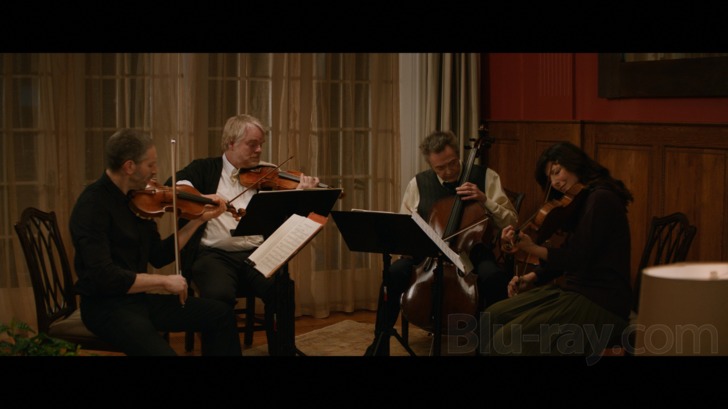
Their group is called The Fugue, and I’m certain this was highly intentional on Zilberman’s part. In musical terms, a fugue is a piece in which themes or phrases are repeated and overlapped, but in psychological speak, it refers to a dissociative state, a kind of amnesia where the sufferer temporarily loses or becomes confused about his or her identity. Both definitions are apropos here. The four members of The Fugue are each going through a kind of late-career crisis. Cellist Peter (Christopher Walken) is the elder statesman of the group, and at the beginning of the film, the early symptoms of Parkinson’s have left him struggling to keep time, his fingers losing their strength on the strings. Peter makes the decision that—barring some miraculous medicine-assisted turnaround—the first concert of their new season will be his last.
He’s already started looking for his replacement, and this immediately tips the group’s careful balance. Violist Juliette (Catherine Keener) considers dropping out herself if Peter quits, but her husband, Robert (Philip Seymour Hoffman), the second violinist, sees it as a chance to reassert himself and reinvigorate the group’s sound. Newly realizing that he’s spent his entire career in the shadow of the first violinist, Daniel (Mark Ivanir)—an extremely anal perfectionist who’s lost the music’s soul in his quest for precision—Robert demands that they take turns playing the lead parts. He also suggests they play their signature piece, Beethoven’s moving Opus 131, entirely by memory, instead of relying on Daniel’s exacting and stultifying notes.
The strain of all this potential change forces open the cracks in the group’s interpersonal dynamics. Robert’s inferiority complex is amplified when Juliette suggests that he wouldn’t make a good first chair violinist, leading him to step out for a one night stand with disastrous consequences. Caught in the middle of this is their college-aged daughter, Alexandra—a slightly too kooky Imogen Poots—who has a chip on her shoulder about her parents being on tour for her entire childhood. Alexandra is also a budding string player under the tutelage of the strict Daniel, and their student/teacher relationship evolves uneasily into a May-to-December affair. This is further complicated by the fact that Daniel once had a romance with Juliette in their early Juilliard days, before she later married Robert out of convenience.
If it all seems a bit soap opera-ish, it is, and there are a few overtly melodramatic moments that could probably be done without. Still, these knotted love tangles aren’t entirely outside the realm of possibility, and A Late Quartet is actually quite subtle in the other ways it develops its characters, particularly the older ones, who are suddenly jolted into looking back on their careers and lives, reflecting on their identities and successes and failures. These are people at the top of their professional game, but they’ve gotten too comfortable in the routine. With Peter’s announcement of his possible departure, it throws their futures into uncertainty.
With the exception of Imogen Poots—whose accent comes and goes, and whose mannerisms seem odd to the point of distraction—the film is wonderfully, and in one case unusually cast. The typically deranged Christopher Walken probably wouldn’t be most filmmakers’ first choice to play a depressed, Parkinsons-afflicted cellist at the tail-end of his career, but he’s so painfully real here that you’ll look forward to seeing him in more similarly serious roles. While Philip Seymour Hoffman is a more conventional choice for Robert—he’s no stranger to playing conflicted, deeply insecure men—his range and depth of emotion once again prove why he’s a master. (And The Master.) Catherine Keener anchors the film with a sort of withering, just-about-fed-up grace, and after smallish parts in Schindler’s List and The Good Shepherd, Mark Ivanir finally gets a role with more dramatic gristle to chew. This is an actors’ movie, and the four leads make beautiful music together, even when their characters don’t.
A Late Quartet Blu-ray Movie, Video Quality 
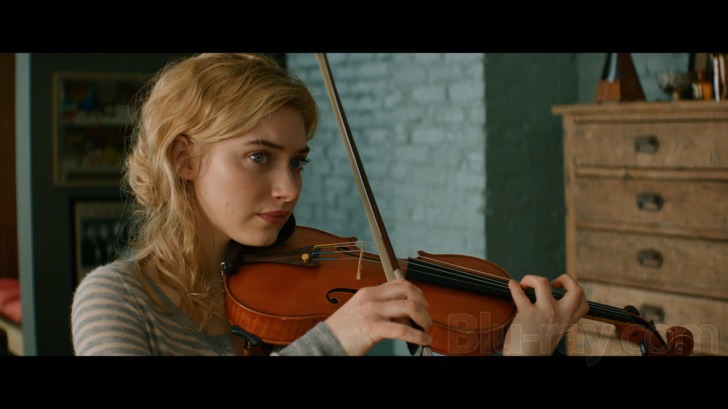
A Late Quartet was shot digitally using Arri Alexa cameras and anamorphic lenses, so the transition to Blu-ray comes rather easily, with a 1080p/AVC-encoded presentation that's sharp, strong, and free from distractions. At most, you may notice some thicker source noise during darker scenes, but the image really does hold up well to pixel-peeping scrutiny. Close-ups are especially crisp—see the screenshot of Philip Seymour Hoffman crying in the shower—and the picture overall is nicely resolved, revealing ample skin and clothing texture, like the weft of Alexandra's knit cap. Likewise, the color grading is balanced, unobtrusive, and largely realistic, while still carrying the punch of good contrast and hue density. (Although there are a few scenes, where shadow detail seems a bit crushed.) DNR and edge enhancement are not concerns, and neither are there any obvious compression artifacts. There are two or three spots where you might spot some slight aliasing on violin/cello strings, but only when they're shot from a long distance. Overall, the picture seems true to both source and intent. No issues here.
A Late Quartet Blu-ray Movie, Audio Quality 
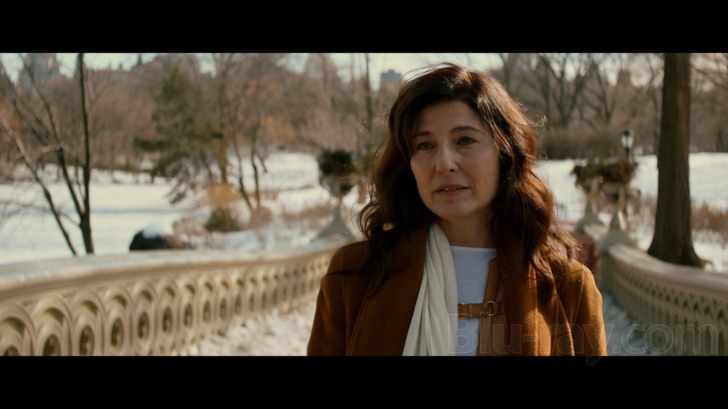
For the most part, A Late Quartet is a quiet, dialogue-centric film, with a DTS-HD Master Audio 5.1 surround track to match. Voices are clear, unmuffled, and balanced at the top of the mix in the front speakers, while the surround channels are often used for low-level environmental ambience— usually street sounds or other outdoor noises. Where the lossless track really becomes worthwhile is in the clarity and depth of the film's music, particularly The Fugue's climactic performance of Opus 131. From the deepest cello rumbles to the highest soaring violin line, the strings sound fantastic —dynamic, lively, and with a great sense of room-filling presence. The disc includes optional English SDH and Spanish subtitles for those who need or want them.
A Late Quartet Blu-ray Movie, Special Features and Extras 
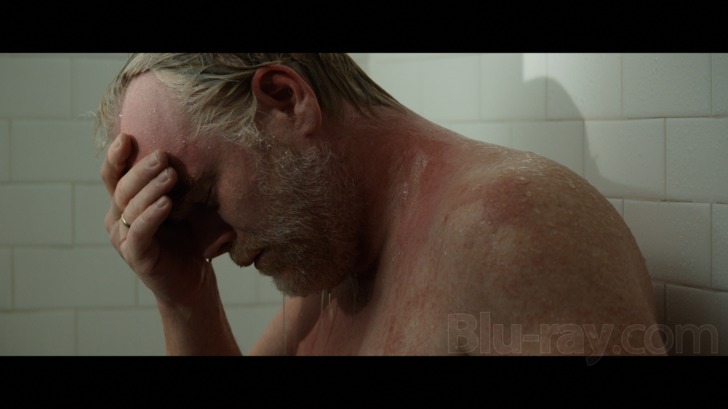
- Discord and Harmony (HD, 7:46): The only extra on the disc is this short EPK-style piece, with clips from the film and interviews with all the key players. Most notably, Christopher Walken says of his role, "I haven't played a part like this...much. An older guy who's not nefarious."
A Late Quartet Blu-ray Movie, Overall Score and Recommendation 
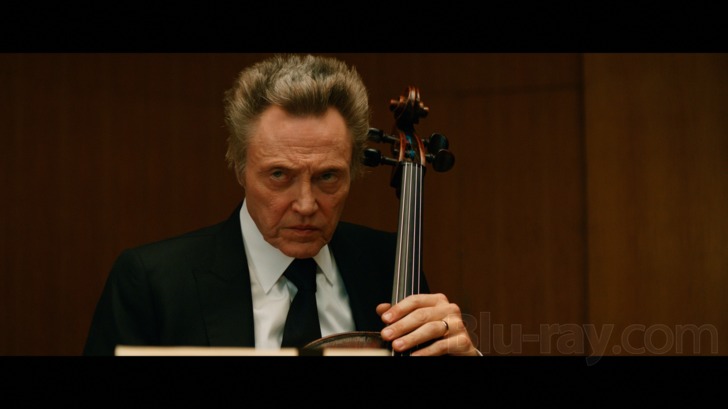
There's something reassuring even in A Late Quartet's we-all-go-out-of-tune-eventually premise; it reminds us that we're not alone, and that all relationships require maintenance and practice to keep them in harmony. This is a quiet drama—almost slight—but it's very moving and universal in its examination of its characters' mid-life, late-career crises. And while you don't have to be a Beethoven expert to enjoy it, the film will be rewarding to those with an interest in classical music. It doesn't dumb anything down. It's also host to four tremendous performances from Christopher Walken, Philip Seymour Hoffman, Catherine Keener, and Mark Ivanir. 20th Century Fox's Blu-ray release is short of special features, but the picture and audio are strong, and the quality of the story merits an easy recommendation.
Similar titles
Similar titles you might also like

Danny Collins
2015

Get on Up
2014

El Cantante
2006

The Buddy Holly Story
Limited Edition to 3000 - SOLD OUT
1978

A Star Is Born
2018

Bessie
2015

Bohemian Rhapsody
2018

I Saw the Light
2015

Hard to Hold
1984

The Soloist
2009

The Doors
1991

Judy
2019

Thirty Two Short Films About Glenn Gould
1993

Love & Mercy
2014

Bob Marley: One Love
2024

A Complete Unknown
2024

Vinyl: The Complete First Season
2016

Back to Black
2024

Elvis
2022

Better Man 4K
Paramount Presents #48
2024